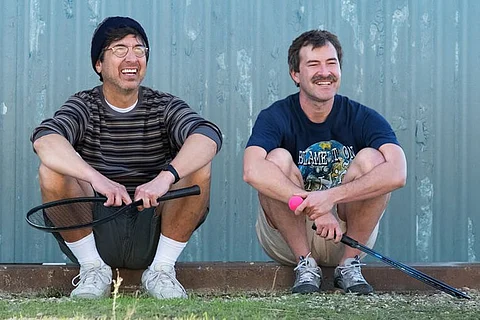

Over the course of cinematic history, the portrayal of ‘masculinity’ has largely remained a hackneyed template. A template that filmmakers have been able to execute with their eyes closed as it has remained unchanged for more than a century. Until very recently – owing to a surge of films that have tried to sidestep this tedious stereotype – a cinematic “man” could comfortably be fit in a tiny tinsel box. How uninspiring!
This week I watched the Netflix original film Paddleton, starring Ray Romano and Mark Duplass. I hope this refreshingly novel portrayal of masculinity proliferates mainstream cinema consumption in the future. It is about time we shift gears from the toxic, rough machismo that is devoid of any vulnerability.
The Duplass Brothers (Mark and Jay) – the trailblazer duo of the ‘mumblecore’ genre have yet again produced an indie masterpiece. Mark has also written and acted in this ‘cancer-buddy-road trip’ film. As a filmmaker, it is heartening and reassuring to see that these small microbudget human stories – unique to the mumblecore genre – have picked up stride in the last decade. It is a promising and welcome change.
(Spoilers ahead)
Paddleton, directed and co-written by Alex Lehmann, is a heartwarming tale of two awkward middle-aged misfits who only find pleasure in each other’s company. Their days are spent playing a made-up game called Paddleton, watching a Kung Fu movie, and eating pizzas. Tragedy strikes when Michael (Mark Duplass) gets diagnosed with terminal cancer, and Andy (Ray Romano) feverishly quizzes the nurse in helpless despair. The heightened profundity of this film rests in the fact that it begins with the prospect of an ‘ending.’
Michael decides to locate the pharmacy that will sell him the lethal meds to end his life rather than going through the pain of chemotherapy, and he wants Andy to help him with his assisted suicide. It is in this road trip that a good part of the cinematic machismo gets torn down. Death and grief are tricky subjects to weave into a film. But Lehmann, who has previously made another soulful film with Mark called Blue Jay, has etched his niche through this one. What’s consistent in his direction is the desperate hide and seek with death that builds up to a crescendo of a poignant climax. It was invigorating to see the way such grief was portrayed by the men, who, in most cases, are expected to turn into stone should such a loss befall them.
While it is true that the last decade has been great for indie cinema across the world, I found myself watching a great deal of ‘coming of age’ genres of children and young adults, or of love and relationships. It was rather stunning to watch a film of two middle-aged men going about the everyday vagaries of life. In the face of it, it would be hard to imagine that a story about a curmudgeonly man and his friendship with a dying neighbour would amount to much. This low expectation could just be the reason why one would enjoy it even more.
Paddleton appears to be Michael’s story, and it is a worthy approach in itself. But I believe this is the story of Andy, “the other guy” as he yells during a powerful scene concealing his tears. Death is inevitable, as is life. But it is those that we leave behind to continue walking this earth – drowning themselves in memories of happiness and gut-wrenching sorrow – whose stories need to be told. Paddleton is subtle and does not rush you into the morbidity of death. It eases you in, and Andy holds your hand gently till the end. It is a collective brilliance of screenplay, direction and acting that brings out a sense of levity to death.
A very commendable means of suggesting that these men have entirely disowned the ‘man-made’ world is through the repetitiveness of their quirky routines entirely antithetical to what’s expected of a “man”. Some might call them outrageous. But the ritualistic way in which they watch and mouth dialogues of “Death Punch”, a Kung Fu movie that foreshadows an ominous end, is actually adorable. A grumpy man who refuses to own a mobile phone and buys a safe to hide the lethal meds transforms into a gullible, pensive listener whose dark jokes during the climax make for tear-jerking chuckles. Ray’s performance exacerbates the misery of Michael’s death. As the end draws closer, the hangman puzzle that doesn’t fetch a word lays the premise for how we comprehend death too. That sometimes, there can be a puzzle with no answer, and a powerful half-time speech doesn’t necessarily motivate us to “fight back.”
With its faults, Paddleton is a film that encompasses a kind of friendship that men are too afraid to have. A peek into how we are so ill-equipped to comprehending death, but how we find the will to move on despite the loss, reminiscing the good times.
Watch the trailer of the film, which is streaming on Netflix now:
About the author:
Vaishnavi Sundar is a writer and a self-taught filmmaker. Her interests lie in an odd mix of cinema, arts, and all things feminist.